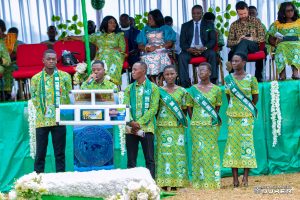Benso SHS Celebrates 30th Anniversary

…Duker Donates GH₵20,000 for “MP’s Entrepreneurship Club”
Member of Parliament (MP) for Tarkwa-Nsuaem constituency, George Mireku Duker, has donated GH₵20,000, towards the establishment of the “MP’s Entrepreneurial & Skills Development Club” at Benso Senior High Technical School (BEST) in the Tarkwa-Nsuaem municipality.
The initiative, which is the first of its kind, will serve as an entrepreneurial incubation hub in the school, with patrons to support the development of students in leadership, business management, skills development and general entrepreneurial skills to enable them fit for the job market or be self-employed after completion of school.
Speaking at the 30th anniversary celebration of the school over the weekend, Mr Duker, believes the initiative should be a significant step in connecting students to the world of work, while earning income.
“In this stage of the 21st Century, employers are looking for smart people who can do their work faster while looking at ways to reduce their cost of operation through the application of science and technology to maximize profit. Hence, modern forms of training through technological means are the surest way to be competitive in the job market,” he said.
Free SHS policy
The MP also disclosed that, Benso Senior High Technical School which was established in 1991 with students population of 21, experienced a decline in student population from 200 in the early 2000s, but significantly increased, since the inception of the Free SHS policy.
“Nana Chairman, I am reliably informed that, after the inception of the Free SHS Policy, it is refreshing to note that, enrollment of students saw a sharp increase, which now stands at about 785, representing almost a four-fold increase in admissions. This touching revelation indicates that many of our young ones would have been left in the dark,” he said.
According to him, “Free SHS may have its challenges, but I can confidently state that it is, by far, one of the most prominent social intervention policies in the sector of Education in sub-Saharan Africa, which satisfies goal 4 of the Sustainable Development Goals (SDGs) to ensure inclusive and equitable quality education for all by 2030”.



Unemployment canker
The anniversary, which was under the theme; “Equipping Student with Employable Skills to Meet the 21st Century Demand: The Role of Stakeholders”,Mr Duker, said the theme was well chosen to address a critical global challenge of unemployment crisis.
He indicated that, “Youth unemployment remains a key global challenge and is quite rife in sub-Saharan Africa. According to a World Bank report in 2023, the world’s youth unemployment stood at 15.58%”.
The MP acknowledged that, “The situation in Ghana is not different; youth unemployment as of 2022 stood at 7.14%, an improvement from 2015 when it stood at 14%, according to data by the World Bank and the Ghana Statistical Service”.
He said, “Despite a significant improvement, 1.3 million Ghanaians between the ages of 15 – 35 years were unemployed as of 2023. Various technical reports by Ghana’s Commission of Technical and Vocal Education and Training (TVET) and other researchers point to skills mismatch and work as a key factor”.
Mr Duker, who is also a Deputy Minister of Lands and Natural Resources said, the age composition of Ghana’s population of 31 million people, based on 2021 population census data, indicates that about 35% are children (0-14 years) and 38% young people (15-35 years).
“This data means that over 60% of Ghana’s population is currently young and what this means is that, failure for we stakeholders, to take appropriate steps to develop and equip the young ones with employable skills by diversifying grammar education or chew and pour style of studies, you can foretell that, dark days of massive unemployment is ahead,” he cautioned.
Way Forward
Touching on means to address the situation, Mr Duker said, “It is therefore, imperative to deepen our quest to develop the skills of the students and, by extension, the youth population”.
He mentioned that, “one of the critical steps towards developing those skills is through the Technical and Vocational Education and Training (TVET) initiatives, which, fortunately, BEST is aligned with as a result of some courses undertaken here. As a model Senior High Technical School, BEST has distinguished itself through programmes like General Art, Home Economics, Metalwork, Applied Electricity, Building and Construction, General Science and General Agric, which are well placed in the job market”.
According to him, most courses currently offered in the school are the bedrock of what the global world of work seeks to attract.
“Therefore, I am optimistic that students who go through training in this school with foresight, determination, and an appropriate support system will acquire the necessary employable skills and excel in the job market,” he said, adding “so, for students gathered here, gaining access to BEST alone is a significant step towards attaining these skills”.
What Employers Want
He told the gathering that, “In this stage of the 21st Century, employers are looking for smart people who can do their work faster while looking at ways to reduce their cost of operation through the application of science and technology to maximize profit. Hence, modern forms of training through technological means are the surest way to be competitive in the job market”.
He said, “in an era marked by rapid technological advancements and a dynamic global economy, the role of Education extends beyond the traditional realms. We are tasked with preparing our students for academic success and a future where adaptability, critical thinking, and practical skills are paramount”.
The event was highly attended by both past and current students, regional and district directors of education, traditional leaders, as well as several invited guests.
Source: Anchorghana.com




